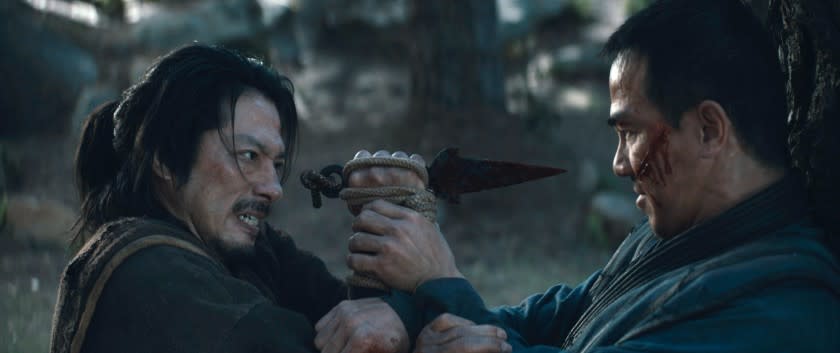Review: It doesn't skimp on gore, but the new 'Mortal Kombat' movie is no flawless victory

The Times is committed to reviewing theatrical film releases during the COVID-19 pandemic. Because moviegoing carries risks during this time, we remind readers to follow health and safety guidelines as outlined by the Centers for Disease Control and Prevention and local health officials.
In the 1997 franchise-killing flop “Mortal Kombat: Annihilation,” the thunder god Lord Raiden delivers an ominous warning: “What closes can also open again.” He’s talking about the portals that separate Earthrealm (good!) from Outworld (bad!), though in retrospect it's tempting to interpret his words as a vaguely optimistic prophecy about the state of moviegoing circa 2021. For better or worse, many of the theaters that closed last year are opening again, and starting this Friday they will be playing (what else?) a brand-new “Mortal Kombat” movie — a blood-slicked reminder that, in arcade fighter games and Hollywood blockbusters alike, no fatality is ever truly permanent.
That’s not to suggest that anyone need rush to see this proficient, disposable, ultra-gory reboot on the big screen, especially since it’s being made available simultaneously on HBO Max. Whether you should see it may depend on your attachment to the original “Mortal Kombat” video games (I have some lingering fondness for them ), as well as your tolerance for a non-interactive simulacrum of those games’ brutal match-ups. Assuming “Godzilla vs. Kong” didn’t sate your appetite for this kind of head-to-head smackdown cinema, you might as well strap yourself in for nearly two hours of interdimensional warfare and Grand Guignol bloodsports, the most baroque instance of which suggests a woodshop project gone horribly awry.
Before that sanguinary highlight, you’ll have to endure some awfully laborious setup, starting with a stab-happy 17th-century Japanese prologue that earns the movie its R rating in the first five minutes. In the more humdrum present day, we meet the handsome, vacant Cole Young (Lewis Tan), an MMA fighter who has seen better days, though he’s about to see worse. He’s one of several Earthrealm dwellers who, marked by the same mysterious circular dragon symbol, are destined to compete in a deadly Mortal Kombat tournament with the supernatural denizens of Outworld. As this movie’s version of Raiden (Tadanobu Asano) solemnly informs us, humanity’s fate hangs in the balance; having already lost nine tournaments in a row, they’re doomed if they lose a 10th.

A few differences in dramatis personae aside, the bare-bones mythology is more or less identical to that of the 1995 film “Mortal Kombat,” a campy hoot best remembered as a calling card for the director Paul W.S. Anderson (who would move on to a more sustained game-adaptation franchise with the “Resident Evil” series). In the new movie (written by Greg Russo and Dave Callaham), Cole must team up with other human fighters like the courageous, cyber-enhanced Jax Briggs (Mehcad Brooks) and the tough, committed Sonya Blade (Jessica McNamee), a Girl Without a Dragon Tattoo who is nonetheless rightly determined to slash her way into the tournament.
Then there’s the treacherous mercenary Kano (Josh Lawson), whose tussle with a large flaming lizard briefly suggests some “Godzilla vs. Kano” crossover potential. Alas, Kano's main dramatic/ostensibly comedic function is to spout racist insults and dated pop-culture references with such frequency that it practically qualifies as his “arcana” — that’s a fancy inner superpower that every Mortal Kombatant must discover in order to survive, let alone win.
As the movie’s many training montages coalesce into a fun-but-frustrating game of “Dude, Where’s My Arcana?,” we get a better look at the stiff Outworld competition, led by the soul-sucking sorcerer Shang Tsung (Chin Han). “Mortal Kombat” enthusiasts will have fun parsing the devilish physiognomies of characters like Goro, Nitara and Mileena, and they will relish the chance to see some of the game’s more notorious disembowelments enacted on the screen in all their gory glory. Some of the most memorable kills are executed by the powerful Bi-Han (Joe Taslim), a.k.a. Sub-Zero, so named for his ability to paralyze his opponents with ice and snow, then snap off their brittle extremities like blood-gushing popsicles. Imagine a Takashi Miike remake of “Frozen” and you’re halfway there.

I should note that Sub-Zero, with his lethal ice balls and fittingly black-and-blue ninja getup, was always my favorite “Mortal Kombat” avatar during my ’90s childhood video-game obsession. Back then the graphics were primitive, the carnage fairly tame: Sure, you could rip out your opponent’s skeleton, but if memory serves, you couldn’t yet stab them in the eye with a giant stalactite made from their own blood. In a way, the PG-13-rated 1995 “Mortal Kombat” (and its ill-fated sequel, “Annihilation”) were of a piece with the early games’ rudimentary visuals, just as this new “Mortal Kombat,” directed by the Australian commercials filmmaker Simon McQuoid, embodies the heightened bloodlust on display in more recent games.
The upgrade, alas, is strictly a technological one. “Mortal Kombat” reflects the ethos of a Hollywood that has evolved in some respects over the past 26 years — the diverse ensemble includes more actors of Asian descent, like Ludi Lin, Max Huang and Hiroyuki Sanada — while remaining, well, frozen in place in others. The craven commitment to fan service that has long afflicted big-budget adaptations is still in evidence. The wooden dialogue and indifferent performances aren’t bugs so much as features of a corporate mindset that sees IP fidelity and imaginative storytelling as mutually exclusive aims. To that end, this “Mortal Kombat” won’t be greeted by its fan base as a soul-sucking disaster. It might have been a more interesting movie if it were.
This story originally appeared in Los Angeles Times.

